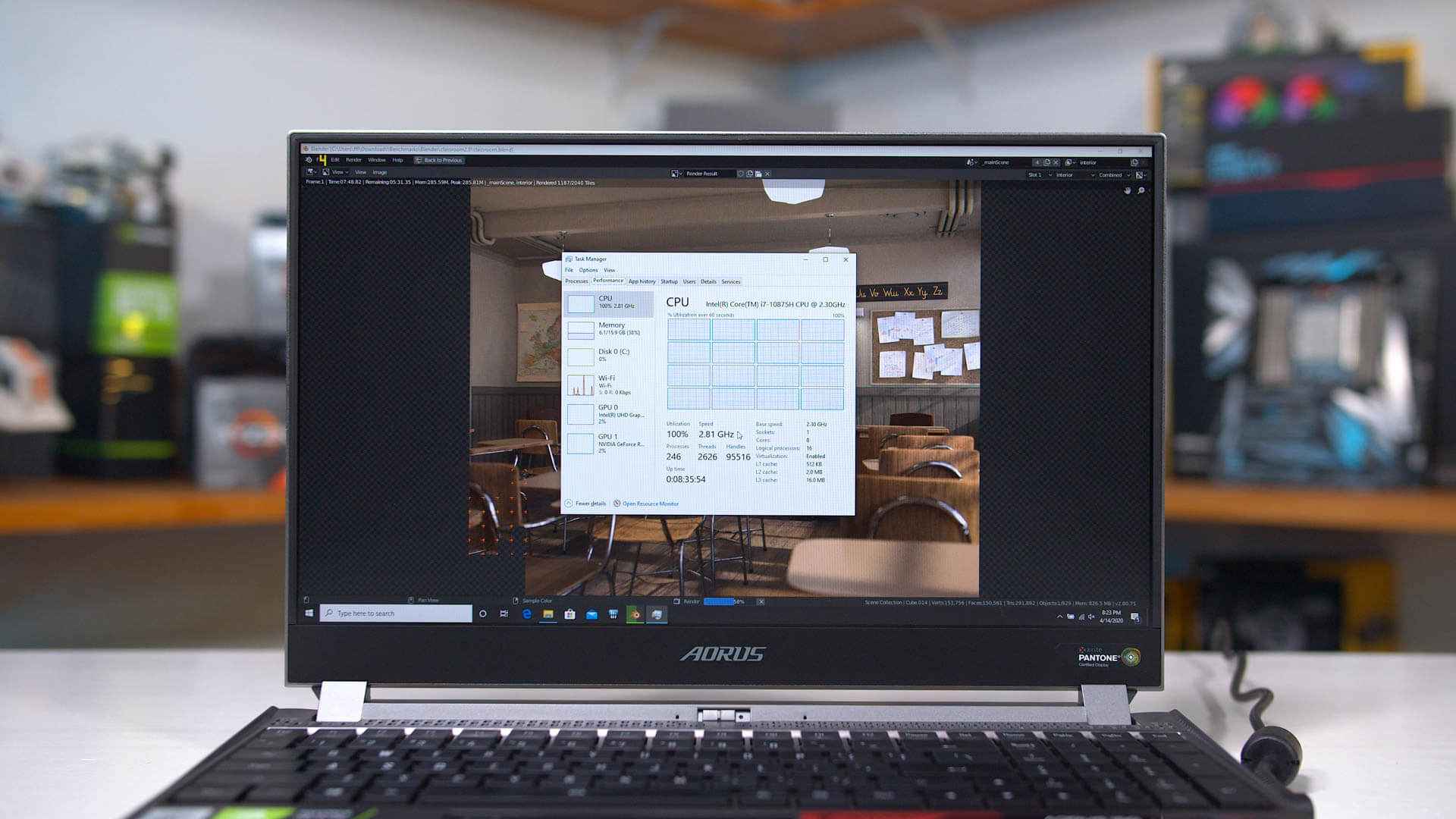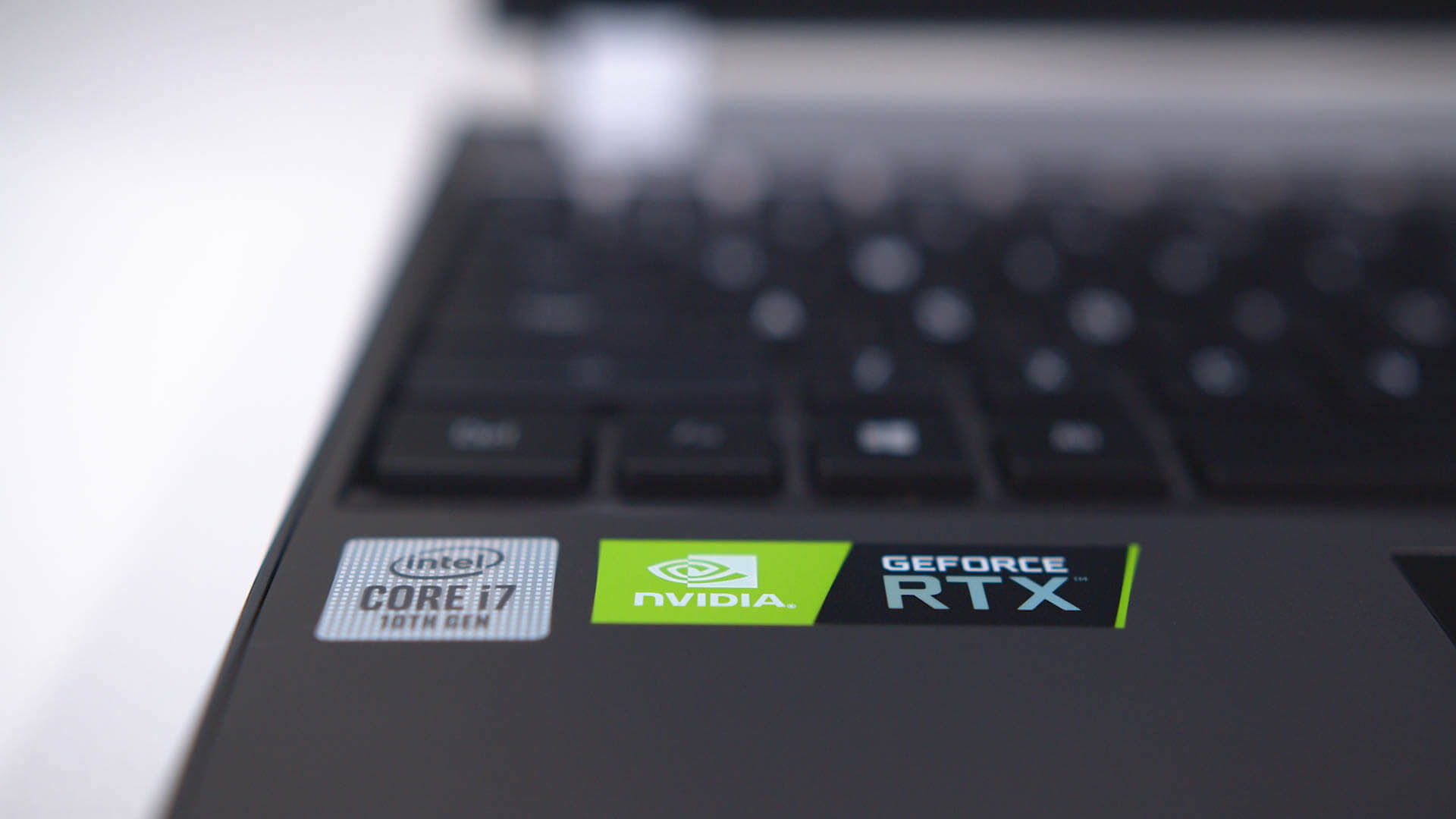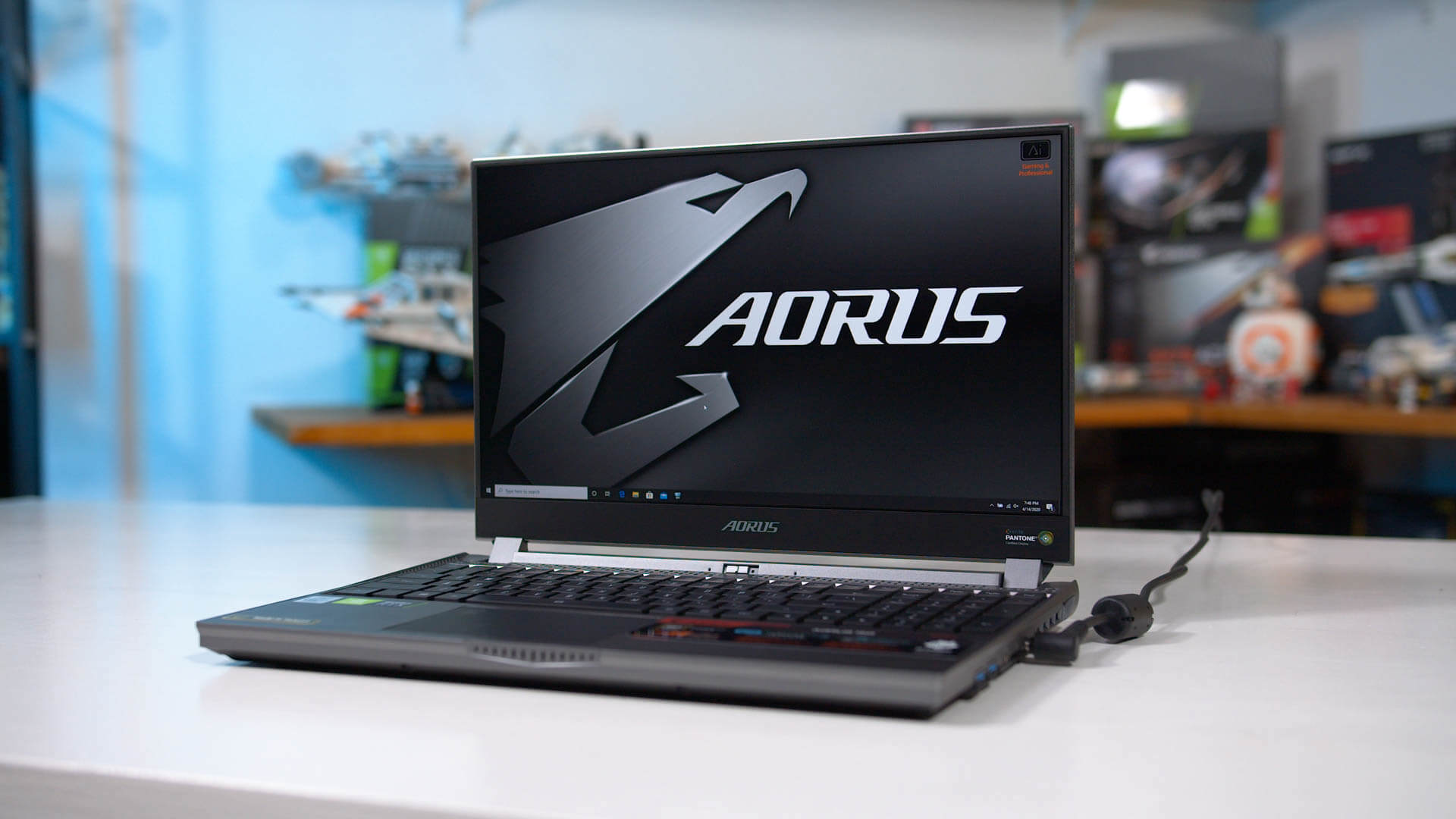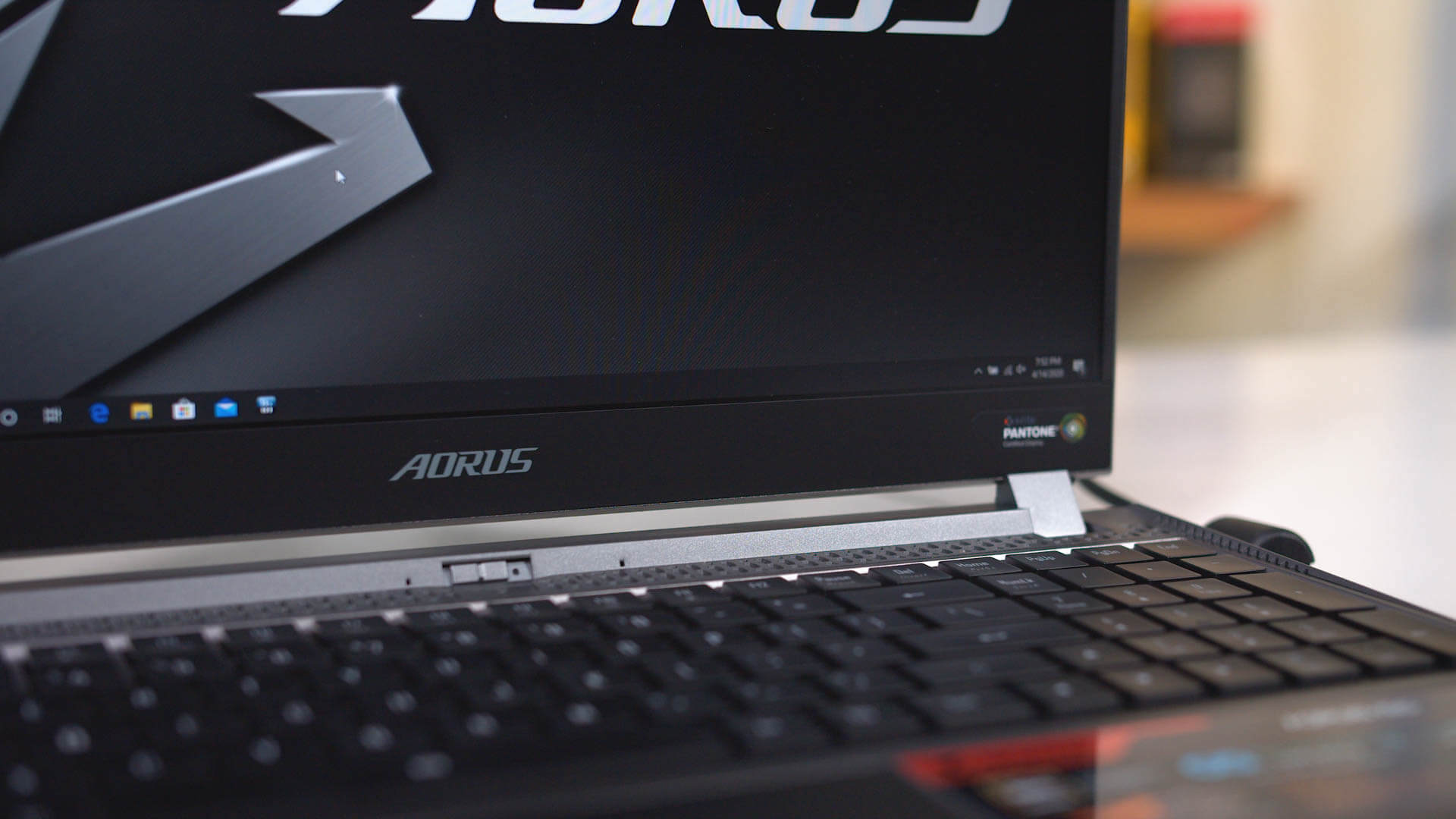Intel Core i7-10875H Review: 8 Cores, 16 Threads for Laptops
Intel officially launched the 10th-gen Core Comet Lake H-serial CPUs for high-performance laptops recently, but it's not until this calendar week that nosotros can hash out performance. Aimed at high-end productivity and gaming laptops, this review volition comprehensively analyze the Core i7-10875H, which is the almost interesting chip in the new series.
We'll compare information technology to previous products like the Core i9-9880H, Core i7-9750H and AMD'southward new Ryzen nine 4900HS to see how it stacks up for loftier-performance mobile productivity. Over the adjacent few weeks and months nosotros'll hopefully check out a range of other 10th-gen CPUs and doing all sorts of comparisons, including deeper dives into the new half dozen-core part and how these chips fare for gaming.

This has been an interesting generation for Intel. The start 10th-gen laptop parts launched many months ago in Baronial 2022. Nosotros saw a split up into the confusing Comet Lake and Ice Lake U series, one on 14nm and one on 10nm. There's no such split up for these higher-power 45W chips in the H-serial: Intel is only offering Comet Lake, which is their 14nm Skylake derivative. Indeed, five years after Skylake first launched, Intel is nonetheless pushing out "new" CPUs with the aforementioned base architecture.

H-series parts offering 8 cores are not new, but with the 9th-gen family they were restricted to the Core i9 series which was only seen in very expensive notebooks. The inclusion of a new 8-core SKU in the Core i7 range means the Core i7-10875H brings an 8-core, 16-thread processor to a somewhat more mainstream market. The rest of the Cadre i7 range offers six cores and twelve threads like with the previous generation. Intel has as well reduced the Core i9 range down to just one 8 core scrap with higher clocks than the i7 CPU. Finally, the Core i5 range remains equally quad cores.

The listed specifications for the Core i7-10875H are very like to the last-gen Core i9-9880H: we have a base clock of 2.3 GHz, 16 MB of L3 cache and a 45W TDP. The simply changes accept occurred in the boost specs. Intel is now touting the scrap's ability to push button upwardly to v.i GHz on a single-core (up from 4.8 GHz). Nevertheless this is only achievable with what Intel calls 'Thermal Velocity Boost'. Essentially this gives the processor 200 MHz of extra frequency when running below 65C, and 100 MHz when running beneath 85C. If the CPU isn't running dainty and absurd, the actual maximum turbo frequency tops out at 4.9 GHz.
Thermal Velocity Heave debuted in 9th-gen Core i9 processors including the 9880H, merely Intel has tweaked the temperature thresholds and added information technology to the Core i7 line in this generation.

Every bit for all-cadre turbo frequencies, Intel lists this as 4.three GHz for the 10875H, upward from 4.one GHz with the 9880H. In a nutshell, nosotros're getting 200 to 300 MHz clock speed increases under turbo conditions with the 10875H compared to 9880H. However with base clocks and power limits remaining the aforementioned, nosotros'd expect long term clock speeds to be similar between processors, which we'll explore a chip later.

Before getting into the benchmarks, let's talk about the examination conditions...
In for review we take the Gigabyte Aorus 15G XB, which packs the Core i7-10875H in multiple ability configurations alongside Nvidia's new RTX 2070 Super Max-Q. We'll be covering the GPU in a separate review, so brand sure you cheque that out. The Aorus came equipped with a 1080p 240Hz brandish and 16GB of DDR4-2933, the new maximum RAM speed supported past 10th-gen parts.

This isn't a laptop review simply we must mention the new Omron mechanical key switches on this laptop, they're really skillful. In making thin and calorie-free gaming laptops, one of the areas that tend to suffer is the keyboard, a lot of them are actually junk, only this is a clicky, surprisingly satisfying switch for such a low profile pattern. The typing experience is nicer than nosotros expected, then kudos to Gigabyte for choosing this.

Testing laptop hardware in an apples-to-apples configuration is challenging as each system is slightly different. For all the results you'll encounter today, we've tried to remove as many variables as possible. This means all systems accept dual-channel memory, and all are configured to use the Intel default processor power configuration and settings unless otherwise noted. Nosotros then boilerplate together results from equivalent laptop configurations (not just one model) to provide a generalized wait at performance from a given CPU.
Often laptops come a little overclocked out of the box and have utilities that allow you to change various power targets and PL1 or PL2 limits. For testing we're setting each laptop to Intel'south default 45W PL1 limit. The Aorus 15G, for example, uses a 52W limit by default, and allows you to choose betwixt five unlike limits from 38W through to 62W. We accept as well tested the 62W configuration today. The curt burst power limit, PL2, is 80W with all setups.

The reason why we exercise this is so nosotros can compare processor performance at a given power level. Unlike with desktops, power consumption is crucial in laptops: more power hungry parts require larger coolers and therefore larger laptops. Comparing fries on an equivalent power level allows us to see how they would perform in an equivalent type of design (check out the full list of laptops tested for this review). Afterwards all, only comparing an 80W CPU to a 35W CPU in laptops wouldn't make much sense, as yous merely couldn't put the 80W chip in a design that just has 35W of cooling capacity.

Some other thing people might ask of us is undervolting operation, given information technology'due south quite popular with enthusiast laptop buyers. Unfortunately, undervolting is disabled with the 10875H on the Aorus 15G and possibly other models too. Nosotros suspect this is in response to the Plundervolt security vulnerability with Intel CPUs, though we didn't receive an official statement on the matter.
Benchmarks
Let'due south start the run of benchmarks with everyone's favorite Cinebench R20. This rendering workload benefits nicely from the extra 2 cores added into the mix: the 8-core 10875H ends up 12 percentage faster than the last-gen Core i7-9750H with vi cores in the multi-thread examination. However in what is perhaps a flake of a surprise, operation doesn't match up with the i9-9880H: this new 8-core part is 6 percentage slower than Intel'due south prior Core i9 processor with the same core count. This suggests that the 10875H isn't clocking quite as loftier as the 9880H.

The 10875H also gets dominated by AMD'south Ryzen ix 4900HS despite consuming more power, falling 30% behind the new Zen ii competitor in this workload. Fifty-fifty when nosotros raise the power limit upward to the maximum Gigabyte supports with the Aorus 15G, at 62W, it all the same falls 18 percent behind the stunning multi-core functioning AMD is providing here.
However the story is different with the unmarried-thread workload. Thanks to higher clock speeds, the 10875H is eight percentage faster than the 9880H in this reasonably long single-thread examination, as well as 1% ahead of the 4900HS. Previously, the 9880H could quite comfortably run a single core at ~4.6 GHz long term within the 45W power limit, so raising the frequency cap up to 4.9 GHz which is what we typically come across in the single-thread workload, does allow for faster performance than previous-gen CPUs here.

We see very similar performance in Cinebench R15, although the 10875H is a fleck slower in the multi-threaded test relative to other CPUs compared to the R20 workload. Compensating for this is a ameliorate single-thread score, the 10875H is up to 10% faster than the 4900HS.

Handbrake is another long-term multi-threaded workload and we do meet a moderate performance heave for this Core i7 CPU compared to the i7-9750H, pulling xi per centum ahead. All the same, like with Cinebench, the 10875H tin't match the 9880H, and falls behind the Ryzen ix 4900HS, fifty-fifty when pushing up to 62W of power consumption. If you plan on using your laptop for x265 video encoding, an 8-core Ryzen APU would be a better choice given its strong performance lead.

Blender follows the tendency we accept seen across the last couple of benchmarks: the 10875H is decently faster than the 9750H, in this case 19% faster, only can't go along up to the 9880H, ending up iii% behind. The 10875H is besides substantially slower than the Ryzen nine 4900HS. Like with the previous two examples, Intel doesn't accept the functioning to match AMD in long term multithreaded tasks and doesn't come shut in terms of efficiency.

7-Zippo compression is a great example of a short term multi-thread workload that runs entirely in the CPU's heave land. Cheers to a generous 80W PL2 ability limit, the 10875H has plenty power to feed all 8 cores and pull essentially ahead of the 9750H, coming in 26% faster in decompression and 34% faster in compression. It also manages to match the performance of the 9880H.
Comparing Intel and AMD in this exam does show AMD pulling well alee in decompression, which is likely going to exist the more than used workload of the two. However, Intel is x% faster for compression, we suspect helped out significantly by its larger enshroud, at 16MB versus just 8MB on the AMD side.

Excel with large calculations is some other benchmark that is favorable to the new Cadre i7-10875H. While all the same a bit slower than the i9-9880H, it does come in 18% faster than the 9750H, and 9% faster than the Ryzen ix 4900HS. This is a short multi-threaded test and with Intel blasting abroad nicely in its boost land taking the win.


For lighter productivity and general app usage, Intel's Core i7-10875H does well but isn't the runaway winner. In PCMark'south Productivity workload, the 10875H is around 6% slower than the 4900HS, while handily beating the 9750H, while in the Essentials test which includes app loading and low-cal web browsing, the 4900HS and 10875H offer equivalent performance. Both 8 core offerings here are a step above previous H-series CPUs, then you lot can expect around a x percent comeback.

One particularly interesting example for the 10875H is MATLAB R2020a using the built-in benchmark. Previously we found that the Core i9-9880H was able to accept the crown over the Ryzen 9 4900HS in this engineering science tool. However, the 10875H can't keep up with the 9880H falling about 8 percent behind.

Acrobat PDF exporting is an piece of cake win for the Core i7-10875H, blasting through this unmarried-core test in record fourth dimension thanks to a combination of a large cache size and high frequencies. This is one of the worst results for Ryzen, it just tin't match the burst speed Intel is offer for this consign-to-epitome workload.

Even so this flips for AES-256 cryptography. SiSoft Sandra does show the 10875H slotting in between the 9880H and 9750H for cryptography bandwidth, but well behind the Ryzen 9 4900HS. This means that for encryption or decryption tasks, Ryzen CPUs should be able to cease alee.

At present we become into some more compute-heavy workloads, so in that location's a bit going on here that needs to exist discussed. We'll start hither with Adobe Photoshop'southward Iris Blur examination, which is mostly CPU limited when you lot have a one-half-decent detached GPU, like is the case with most H-series laptops. It's a tight battle at the elevation between the 8-core options, the 10875H is 5% backside the 9880H but 6% alee of the Ryzen 9 4900HS.

And we come across similar margins in Puget'due south Photoshop workload. The 10875H isn't the outright fastest CPU for Photoshop, merely information technology's a very capable fleck in this app and notably ahead of the Ryzen 9 4900HS. It'south also a decent 16% faster than the 9750H, Photoshop likes frequency merely information technology too likes cores depending on the task you are performing, and the 10875H is faster in both regards.

Time for some Adobe Premiere results. Intel benefits in this application from hardware accelerated encoding via QuickSync, whatever configuration that doesn't support this which includes all AMD processors and our i9-9880H test laptop falls a flake behind in this examination.
For example, in the Puget Export Test, the Ryzen 9 4900HS is equivalent to a QuickSync enabled i7-9750H, while the 10875H comes in eleven% faster, admitting with a faster GPU too. However in this particular workload we aren't often GPU limited, Intel does see meliorate performance here by virtue of supporting QuickSync and in many cases this makes it a better choice for those that like to export videos in Premiere.

While Intel configurations tin can exist upwardly to 25% faster in specific QuickSync accelerated tests, Ryzen is faster for software encoding, for example when performing a 2 laissez passer H.264 encode using the settings we use for rendering YouTube videos.

Intel also falls backside in Puget's Alive Playback test: while the 10875H is 2% faster than the 9880H, it'due south nine% behind the Ryzen 9 4900HS for viewing footage in the timeline. It's also significantly slower for running lightly-threaded effects like the Warp Stabilizer: the 10875H is iii% faster than a 9750H for stabilizing footage, but xv% slower than AMD's Zen 2 CPU. This isn't a full single-threaded test, it uses 1-ii cores with a unmarried instance, and it seems that Intel is only seeing gains here when 100% unmarried-threaded.

Here'south a look at how the Core i7-10875H stacks up against the Core i9-9880H in clock speeds across the first ten minutes of our Handbrake x265 exam. Both CPUs fluctuate between 2.seven GHz and two.8 GHz all-core for the about function, which of grade is well beneath the rated 4.3 GHz all-core turbo for this processor. But mobile processors generally don't get anywhere nigh those all-core numbers long term, due to their power limits.
With clock speeds so shut betwixt these ii processors, this suggests Intel have made no improvements to 14nm efficiency between the 9th and tenth generations. In this examination the 9880H is faster, about one.5% faster, and that seems down to very slightly college clock speeds on average with the 9880H, in the first 10 minutes the 9880H was clocked 1% higher on boilerplate.
Performance Comparisons
Before wrapping this 1 up, let'due south have a await at some performance comparisons. We'll start here with the i7-10875H versus the i9-9880H, a boxing of 2 very like CPUs. The 10875H has a articulate advantage in single-threaded workloads, but exterior of this, the 9880H is faster.
Core i7-10875H vs. Cadre i9-9880H

Slightly faster in long term multi-threaded tasks, and moderately faster in shorter term tasks where the college PL2 limit for our 9880H system leads to an advantage. From an efficiency standpoint, both CPUs seem identical, and that's basically because they are.
Core i7-10875H vs. Core i7-9750H
The Cadre i7-10875H brings a operation gain to the table in this comparing. In unmarried-thread workloads this could be a xv-20 percent gain, while for multi-thread we're looking at 10 to 20 percent depending on the test. The 10875H is universally faster as it has both more cores and higher unmarried-core turbo frequencies inside the aforementioned power limit. As it can run more cores at a relatively minor decrease to frequency, it ends up sitting in a more efficient point on the voltage frequency curve which is why we come across college performance despite the same 45W ability limit.

As for increasing the TDP of this processor from its default 45W up to the maximum 62W supported by our Gigabyte Aorus 15 (outside of using XTU), you can expect to run across up to an 18 pct performance improvement in long term multi-thread workloads. However, gains for most other workloads are express equally they're either single-core or simply use the boost period, which remain unchanged.

Cadre i7-10875H vs. Ryzen 9 4900HS
The Core i7-10875H is by and large slower than the Ryzen nine 4900HS while consuming more power. This is especially true for any long-term multi-thread workloads, where the 10875H is 25 to 30 percent slower. In lightly threaded tests, the 10875H tends to be equivalent to AMD's efficient Zen 2 design or marginally slower. All the same, the 10875H takes the lead in pure single-thread tests, also as anything enshroud express, like Excel or Photoshop. Workloads that make utilise of QuickSync like Adobe Premiere exports are besides faster on the Intel CPU.


Despite being able to easily increment the ability limit on the 10875H, which is something our Ryzen 9 4900HS examination organisation in the Asus Zephyrus G14 did not, the 10875H is withal generally slower in well-nigh workloads at 62W, especially anything long term or multi-threaded. Unless you can find a 10875H system that really ups that power upkeep to above 90W, nosotros expect most 10875H configurations to come in backside a similar Ryzen system in these sorts of tests.
What We Learned
This is the starting time tenth-gen Comet Lake H processor we've tested and arguably the nigh interesting of the bunch. Some may look at the Core i7-10875H with skepticism with Intel keeping the 14nm process and Skylake architecture. This is a valid outlook, merely we do think there are some positives, so we'll talk about those first.
The biggest one is Intel bringing 8 cores down into the Cadre i7 space for the start time. Spending quite a lot of money to get a Core i9 arrangement if y'all wanted an 8-core processor was not worth information technology most of the time, only now cheers to competition, Intel's hand was forced into offering sometime Core i9 operation at a lower toll point. In practice nosotros are getting 10 to xx percent more than performance than a 9750H CPU.

Intel also holds the single-thread performance crown. Information technology's non because they're hitting 5 GHz -- because in almost circumstances they aren't -- merely even at a reasonably high 4.8 GHz, they accept the all-time unmarried-thread performance. Combined with a larger cache and some niche advantages like QuickSync support in applications, in that location are some workloads where Intel'south eight-core CPU is the fastest.
Now, accept into consideration that the 8-core 10875H is not a drop-in replacement for the Core i7-9750H, which was used across a wide range of systems. At to the lowest degree in the short term, wait to see those more affordable 9750H laptops get an upgrade to the half-dozen-core 10750H, not the 10875H.
We've been able to assemble some pricing data from manufacturers like MSI and Gigabyte, and the Core i7-10875H will still sit a class higher up the 10750H. Not quite up there with Cadre i9s of old, but still reasonably expensive. MSI'due south cheapest 10875H laptop, for example, starts at $1,800 with an RTX 2060 GPU, while the 10750H is available in $one,200 systems. Directly comparing their Creator 17 systems shows the 10875H laptop is a $300 add-in option. Also, most of the laptops that utilize the 10875H are your premium RTX 2070-class units.

What has changed from years prior is that AMD is joining the political party and they are doing so with a more aggressive pricing scheme. Right now y'all can go an Asus TUF Gaming A15 with the Ryzen 7 4800H and RTX 2060 for simply $1,200. Intel laptops that also feature the RTX 2060 and compete on price are using a six-cadre CPU, non this new 8-core.
It's possible the Core i7-10875H will see direct contest from the Ryzen ix 4900HS which is significantly faster in anything long term and multi-threaded. They are almost a match in lighter productivity and flare-up type applications, while Intel does take the lead in pure single-thread workloads. In this regard, what remains to be seen is how well AMD can cater to laptop makers, after all it's a newcomer to this segment where Intel has ruled alone for a long time. A bulk of OEMs accept opted to launch high-end H-series laptops with 10th-gen Intel parts and but a few offering the option to swap to Ryzen.
The next step is testing which CPU is faster for high-end detached GPU gaming. That's something we'll have to explore when we get the correct laptops on hand. We anticipate this volition be a shut boxing, but we're not wiling to call it either fashion until we run the benchmarks. Look out for that over the coming weeks.
Shopping Shortcuts
- Intel Cadre i7-10875H Laptops on Amazon
- Gigabyte Aorus 15G XB on Amazon
- Nvidia RTX 2070 Max-Q Laptops on Amazon
- AMD Ryzen nine 4900HS Laptops on Amazon
- Nvidia RTX 2060 Max-Q Laptops on Amazon
- Core i7-9750H Laptops on Amazon
- Core i7-10710U Laptops on Amazon
Source: https://www.techspot.com/review/2012-intel-core-i7-10875h/
Posted by: williamshapanke.blogspot.com


0 Response to "Intel Core i7-10875H Review: 8 Cores, 16 Threads for Laptops"
Post a Comment